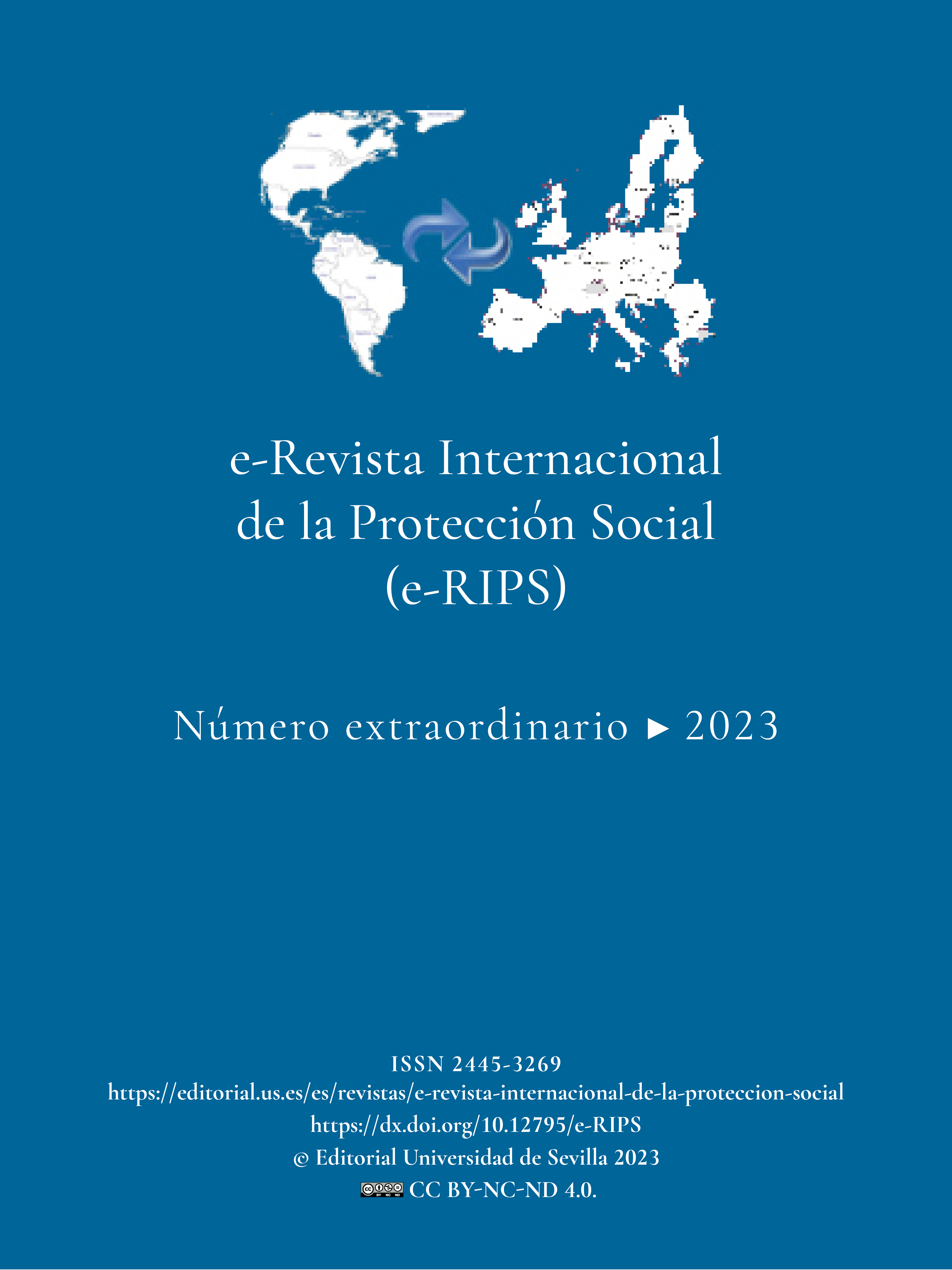Empleo no estandarizado en Alemania: trabajadores por cuenta propia y trabajadores en mini-empleos
DOI:
https://doi.org/10.12795/e-RIPS.2023.mon.09Palabras clave:
Sistema de Seguridad Social alemán, Trabajadores autónomos, Mini-empleos, Precariedad laboral, Trabajadores no estandarizadosResumen
Este estudio propone la reflexión a cerca de dos formas de trabajo no estándar en Alemania: el autoempleo y los denominados mini-empleos. Mientras que en una amplia mayoría de Estados miembros de la Unión europea los trabajadores autónomos están legal y obligatoriamente incluidos en alguno de los regímenes de la Seguridad Social, en Alemania esta obligatoriedad solo está prevista para un reducido número de supuestos dentro del más genérico colectivo de trabajadores por cuenta propia. Los mini-empleos son otra peculiaridad alemana en la medida en que conllevan un régimen jurídico distinto al del trabajo estándar en lo que se refiere a la contribución y protección en materia de Seguridad social. Esta investigación se construye, pues, ofreciendo un breve repaso por el sistema alemán de Seguridad Social para a posteriori abundar en la discusión doctrinal y jurídica que actualmente circundan a los colectivos apenas referidos.
Descargas
Citas
Bonin, H./Krause-Pilatus, A./Rinne, U.: Selbständige Tätigkeit in Deutschland, Study conducted for the Federal Ministry of Labor and Social Affairs, 2022, https://www.ssoar.info/ssoar/bitstream/handle/document/79972/ssoar-2022-bonin_et_al– Selbststandige_Erwerbstatigkeit_in_Deutschland_Aktualisierung.pdf?sequence=1&isAllowed=y&lnkname=ssoar-2022-bonin_et_al-Selbststandige_Erwerbstatigkeit_in_Deutschland_Aktualisierung.pdf.
Collischon, M./ Cygan-Rehm, K./; Riphahn, R.: „Minijobs in Kleinbetrieben: Sozialversicherungspflichtige Beschäftigung wird verdrängt“, IAB-Forum 20. October 2021, https://www.iab-forum.de/minijobs-in-kleinbetrieben-sozialversicherungspflichtige-beschaeftigung-wird-verdraengt/
Deutsche Rentenversicherung Bund, Schriftliche Stellungnahme, 15.4.2021, DEUTSCHER BUNDESTAG Ausschussdrucksache 19(11)1032 https://www.bundestag.de/resource/blob/834696/0b702b0912317ddc7010fed0321368fc/19-11-1032-SN-DRV-data.pdf
Essers, G. and Pennings, F.: “Gaps in social security protection of mobile persons: Options for filling these gaps”, European Journal of Social Security, 2020, vol. 22 (2), pp. 163-179.
European Commission: Case study: Gaps in access to social protection for mini-jobs in Germany, (written by Nicola Duell) 2018.
Eichenhofer, E.: Sozialrecht, 12. Edition, Tübingen: Mohr Siebeck, 2021.
Haasler, S. and Hokema, A.: “Female Solo Self-Employment in Germany; The role of transitions and learning from a life course perspective”, Social Inclusion, vol. 10, issue 4, pp. 150-160.
Koppernock, M.: “, Minijobs” – ein deutscher Sonderweg auf dem Arbeitsmarkt“, Neue Zeitschrift für Sozialrecht 2022, pp. 364-371.
Reinhard, H.-J.: “The New Basic Pension Supplement in Germany”, in Devetzi, S. (ed).: Minimum Income in Old Age (in print), Sakkoulas, Thessaloniki, 2023.
Schulze Buschoff, K. /Conen, W./Schippers, J. “Solo-Selbständigkeit – eine prekäre Beschäfitgungsform?”, WSI-Mitteilungen 2017, pp. 54-61.
Verschueren, H: “The role and limits of European social security coordination in guaranteeing migrants social benefits”, European Journal of Social Security 2020, vol. 22 (4), pp. 390-402.
Descargas
Publicado
Cómo citar
Número
Sección
Licencia
Derechos de autor 2023 Stamatia Devetzi

Esta obra está bajo una licencia internacional Creative Commons Atribución-NoComercial-CompartirIgual 4.0.
e-Revista Internacional de la Protección Social es una revista de acceso abierto, lo que significa que todo su contenido está disponible gratuitamente para el usuario o su institución. Los usuarios pueden leer, descargar, copiar, distribuir, imprimir, buscar o enlazar con el texto completo de los artículos, o utilizarlos para cualquier otro fin lícito, sin solicitar permiso previo al editor o al autor. Esta definición de acceso abierto se ajusta a la Iniciativa de Acceso Abierto de Budapest (BOAI).
 4.0
4.0
A menos que se indique lo contrario, todo el contenido de la edición electrónica se distribuye bajo una " licencia internacional Creative Commons Atribución-Nocomercial-Compartirigual 4.0 Internacional". Puede consultar la versión informativa y el texto legal de la licencia aquí. Esto debe indicarse expresamente de esta manera cuando sea necesario.
En caso de aceptación del manuscrito, los autores ceden los derechos de la obra para su publicación a eRIPS. Revista Internacional de la Protección Social bajo el contrato de licencia Reconocimiento-NoComercial-CompartirIgual 4.0 Internacional (CC BY-NC-SA 4.0). Los autores conservan los derechos de autor y terceros están autorizados a compartir y adaptar la obra, siempre que cumplan con los términos y condiciones establecidos en la licencia.
- Usted debe dar crédito de manera adecuada , brindar un enlace a la licencia, e indicar si se han realizado cambios . Puede hacerlo en cualquier forma razonable, pero no de forma tal que sugiera que usted o su uso tienen el apoyo de la licenciante.
- Usted no puede hacer uso del material con propósitos comerciales .
- Si remezcla, transforma o crea a partir del material, debe publicar sus contribuciones bajo la misma licencia que el original.
Se puede encontrar más información en https://creativecommons.org/licenses/by-nc-sa/4.0/deed.es
Se permite y recomienda a los autores/as difundir su obra a través de Internet (p. ej.: en archivos telemáticos institucionales o en su página web) antes y durante el proceso de envío, lo cual puede producir intercambios interesantes y aumentar las citas de la obra publicada.











